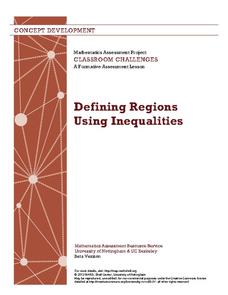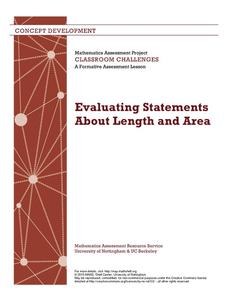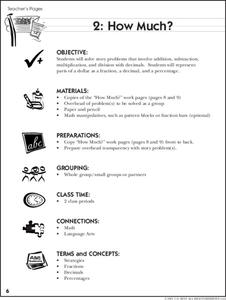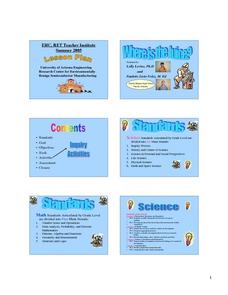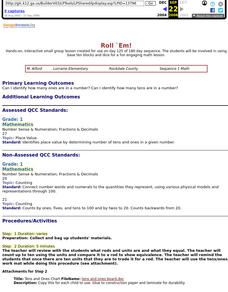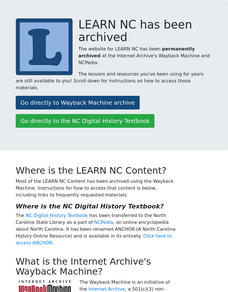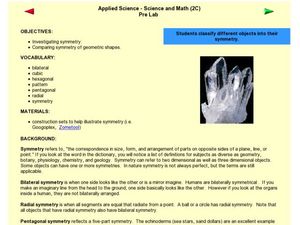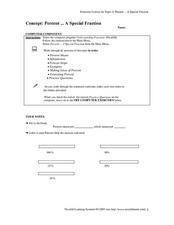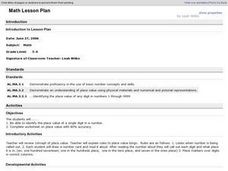American Statistical Association
EllipSeeIt: Visualizing Strength and Direction of Correlation
Seeing is believing. Given several bivariate data sets, learners make scatter plots using the online SeeIt program to visualize the correlation. To get a more complete picture of the topic, they research their own data set and perform an...
MARS, Shell Center, University of Nottingham
Defining Regions Using Inequalities
Your young graphers will collaboratively play their way to a better understanding of the solution set produced by the combining of inequalities. Cooperation and communication are emphasized by the teacher asking questions to guide the...
Mathematics Assessment Project
Designing 3d Products: Candy Cartons
Wouldn't it be great to work in a candy factory? Learners get their chance as they first design a carton for a candy that meets certain requirements. They then examine and analyze nets and explanations in sample student responses.
Mathematics Assessment Project
Classifying Proportion and Non-Proportion Situations
Proportions, proportions, everywhere. Class members complete an assessment task solving problems involving proportionality. They then complete an activity classifying given situations as proportional or non-proportional.
Mathematics Assessment Project
Discovering the Pythagorean Theorem
Young mathematicians join the ancient order of the Pythagoreans by completing an assessment task that asks them to find the area of tilted squares on dot paper. They then look at patterns in the squares to develop the...
Mathematics Assessment Project
Evaluating Statements About Length and Area
Class members complete an assessment task by identifying whether statements about triangles and quadrilaterals are always true, sometimes true, or never true. They then participate in a sorting activity with the same objective.
Mathematics Assessment Project
Evaluating Statements About Enlargements
Double, toil ,and double linear dimensions. Learners first complete an assessment investigating how doubling linear dimensions affects the area of pizzas and the volume of popcorn containers. They then complete an activity investigating...
Curated OER
How Much?
It's time to go back over all that your class has learned about decimals, fractions, and percentages! To do so, individuals solve story problems that involve addition, subtraction, multiplication, and division with decimals, explain how...
Curated OER
Symmetrical Journals
Students examine the concept of symmetry by studying the symmetry of symbols in a wall painting and creating journals with a symmetrical design. After a class review of symmetry and identifying the line of symmetry in several objects in...
Curated OER
Going out of Business: Pythagorean Theorem
Students find the length of diagonals. In this Pythagorean theorem lesson, students use the Pythagorean theorem to determine the length of diagonals.
Curated OER
Where Is The Juice?
Students are introduced to the component's of Ohm's Law. In groups, they practice their problem solving skills by reviewing problems solved earlier. They participate in activities that help them gather information on the importance of...
Curated OER
Roll `Em!
First graders engage in using base ten blocks and dice for a fun engaging math lesson. They use a worksheet imbedded in this lesson as the game board to help them play this math game.
Curated OER
Addition Stories
First graders incorporate language expressions, such as first, then, and together into a story and write the math equations that they represent. Concepts for the process of addition are developed using manipulatives, modeling, and...
Curated OER
Addition and Subtraction of Integers
Sixth graders complete a pre-test of addition and subtraction of integers, then watch a powerpoint presentation on the concept. In this mathematics lesson, 6th graders draw number lines and chip boards to show the process. Students work...
Curated OER
Death by Particles
Emerging epidemiologists define relative risk and read an article about the effect of particulate pollution on the cardiovascular health of women. They record the relative risk values, graph them, and answer analysis questions. This is a...
Curated OER
What Makes a Dog a Dog
First graders recall and verbally list the parts of a dog, or a chosen subject, based on observations using the senses. They discriminate between living and non-living subjects, and create artistic representations of the parts of a dog.
Curated OER
Symmetry
Sixth graders explore symmetry and discuss the difference between a rotation and reflection. Using hands-on activities, such as folding paper shapes, they discover how to find the lines of symmetry and symmetrical characteristics. As a...
Curated OER
Concept: Percent ... A Special Fraction
In this percent worksheet, students review and study what percent means, what percent strips are, making sense of percents and estimating percents. Students complete ten word problems.
Curated OER
Place Value Bingo
Students identify the place value of numbers from 1-10,000. In this place value instructional activity, students play a bingo game with place value. Students answer questions about place value on a worksheet.
Curated OER
Reinforcing Fractions Using a Fraction Calculator
Students complete fraction word problems using TI-Explorer Calculators.
Curated OER
Social Studies: Adinkra Printing
First graders demonstrate a sense of artistic composition by creating shapes and symbols in the pattern of African Adinkra printing. They use glue to create a raised design and then print it on colored paper. Students use symbols from...
Curated OER
Getting to Know You
Students read a book about understanding differences. In this getting to know you lesson, students sit in a circle, roll a ball to each other and tell one thing about themselves when they get the ball. Students read the book...
Curated OER
Space Circles
Fifth graders calculate the diameters and radius of planets as a book is read to them. In this diameter and radius lesson plan, 5th graders read the book Space Circles and calculate the measurements based on the information in this book.
Curated OER
Side Splitter Triangles
Students investigate the side splitter theorem. In this geometry lesson, students estimate and solve problems dealing with ratios and proportions. They identify angles created by lines that are parallel.

